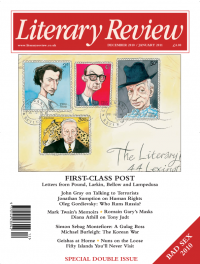Sarah A Smith
Love, Marriage and Ethnic Ovens
Pulse
By Julian Barnes
Jonathan Cape 228 pp £16.99
Julian Barnes's writing, with its carefully calibrated shifts of tone, gently mocking humour and focus on affairs of the heart, is perfectly suited to the short-story format. Although his third collection, Pulse, is less thematically structured than his previous work, there is a fluidity and playfulness to this varied body of stories which, if not always successful, is often very pleasing.
Pulse is divided into two halves, the first being the funniest and most persuasive. The protagonist here is Barnes's version of The Good Bloke – a nice enough chap in early middle age, well meaning but liable to become hopelessly entangled by his insecurities. His antagonist, scarcely glimpsed

Sign Up to our newsletter
Receive free articles, highlights from the archive, news, details of prizes, and much more.@Lit_Review
Follow Literary Review on Twitter
Twitter Feed
How to ruin a film - a short guide by @TWHodgkinson:
Thomas W Hodgkinson - There Was No Sorcerer
Thomas W Hodgkinson: There Was No Sorcerer - Box Office Poison: Hollywood’s Story in a Century of Flops by Tim Robey
literaryreview.co.uk
How to ruin a film - a short guide by @TWHodgkinson:
Thomas W Hodgkinson - There Was No Sorcerer
Thomas W Hodgkinson: There Was No Sorcerer - Box Office Poison: Hollywood’s Story in a Century of Flops by Tim Robey
literaryreview.co.uk
Give the gift that lasts all year with a subscription to Literary Review. Save up to 35% on the cover price when you visit us at https://literaryreview.co.uk/subscribe and enter the code 'XMAS24'